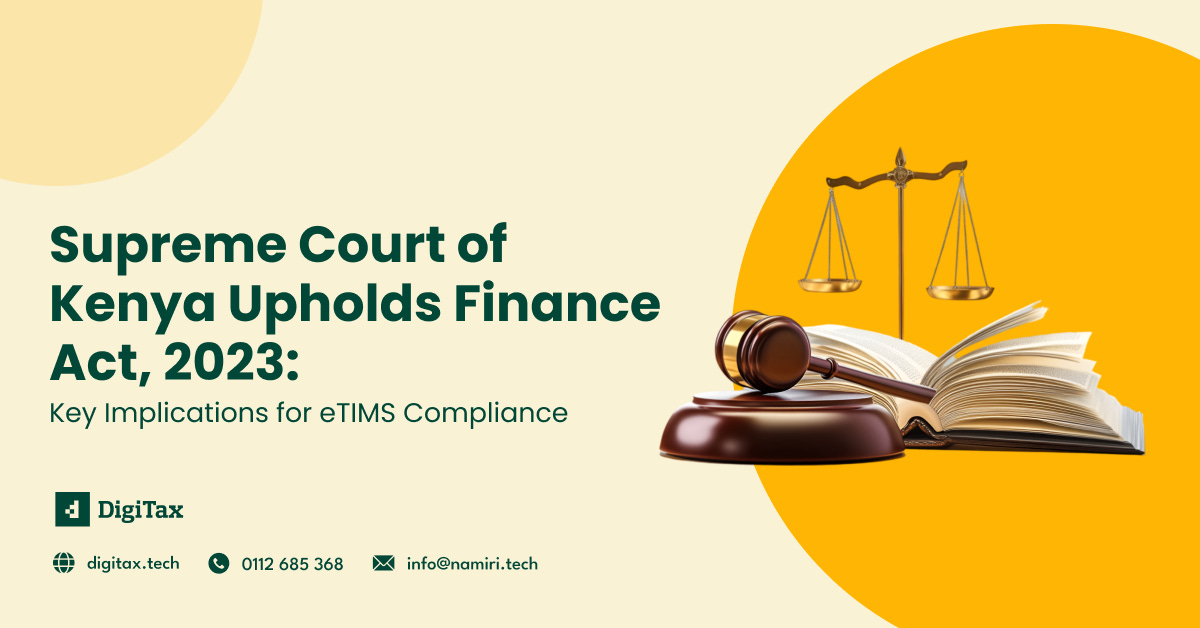Supreme Court of Kenya Upholds Finance Act, 2023: Key Implications for eTIMS Compliance
In a landmark decision, the Supreme Court of Kenya has upheld the constitutionality of the Finance Act, 2023, following the consolidated appeals in SC Petition Nos. 31, 32 & 33 of 2024. This judgement, which overturns the Court of Appeal's earlier declaration of unconstitutionality, has significant implications for businesses, particularly regarding the Electronic Tax Invoice Management System (eTIMS).
Background
The appeals were brought by the Cabinet Secretary for the National Treasury and Planning, the Attorney General, the National Assembly, the Speaker of the National Assembly, and the Kenya Revenue Authority. They challenged the Court of Appeal's decision, which had been in favour of Okiya Omtatah and other respondents who initially contested the Finance Act, 2023.
Key Court Findings
The Supreme Court's analysis focused on several critical issues, including the legislative process, public participation, and the role of the Senate. The court concluded that the Finance Act, 2023, is a money Bill and does not require Senate concurrence. It also found that the public participation conducted was sufficient and that the estimates of revenue were included in the budget-making process.
However, the court declared certain sections of the Act unconstitutional, specifically Sections 76 and 78 (amending Section 7 of the Kenya Roads Act) and Section 87 (amending Section 28 of the Unclaimed Financial Assets Act), as they were not directly connected to a money Bill.
Impact on eTIMS Compliance
One of the most critical aspects of the Finance Act, 2023, that remains in force is the requirement for electronic invoicing under eTIMS. This provision mandates that all expenses must be supported by electronic invoices to be deductible.
The Supreme Court's determination on the Finance Act 2023 has empowered the KRA to increase its vigilance in monitoring and auditing taxpayers. The primary objective being to ensure that businesses comply with the eTIMS. This move is aimed at enhancing tax compliance, reducing tax evasion, and increasing revenue collection.
Key Implications:
Mandatory eTIMS Compliance: Businesses must ensure that all their invoicing is conducted through the eTIMS to qualify for expense deductions. This requirement aims to enhance transparency and accountability in tax reporting.
Operational Adjustments: Companies will need to invest in the necessary technology and training to comply with eTIMS requirements. This may involve upgrading existing systems or adopting new software solutions.
Audit and Monitoring: The Kenya Revenue Authority (KRA) is expected to increase its monitoring and auditing activities to ensure compliance with the eTIMS mandate. Non-compliance could result in penalties and disallowed deductions.
Penalties for Non-Compliance
Non-compliance with the eTIMS mandate can result in severe penalties for businesses. The penalties are designed to encourage adherence to the new regulations and deter tax evasion. Here are the specific penalties that taxpayers should be aware of:
Issuing Non-Compliant Invoices: Issuing invoices that do not comply with the eTIMS requirements will attract a penalty of two times the amount due. This penalty is aimed at ensuring that all invoices issued are in line with the new electronic system.
Failure to Submit Tax Returns: Businesses that fail to submit their tax returns on time will be subject to a penalty of 5% of the tax due or Ksh 20,000, whichever is higher. This penalty underscores the importance of timely submission of tax returns.
Incorrect Tax Returns: Submitting incorrect tax returns, whether intentionally or due to negligence, will result in a penalty of 20% of the tax shortfall. This penalty is intended to promote accuracy and honesty in tax reporting.
Late Payment of Taxes: Late payment of taxes will attract a penalty of 2% per month on the unpaid tax amount. This penalty is designed to encourage prompt payment of taxes.
Disallowed Deductions
In addition to penalties, the Finance Act 2023 also outlines specific deductions that will be disallowed if businesses fail to comply with the eTIMS mandate. These disallowed deductions can significantly impact a business's taxable income and overall tax liability. Here are the key disallowed deductions:
Non-Compliant Invoices: Any expenses incurred that are supported by non-compliant invoices will not be allowed as deductions. This means that businesses will incur income tax at 30% for corporates and based on graduated scale for individuals for non-compliant invoices.
Unverified Expenses: Expenses that cannot be verified through the eTIMS system will be disallowed. This emphasizes the importance of maintaining accurate and verifiable records of all business transactions.
Non-Registered Suppliers: Payments made to suppliers who are not registered with the eTIMS system will not be allowed as deductions. Businesses must ensure that their suppliers are compliant with the eTIMS mandate to claim deductions.
Personal Expenses: Any expenses that are deemed to be personal in nature will be disallowed. This includes expenses that are not directly related to the business's operations.
Moving Forward
The Supreme Court's decision underscores the importance of adhering to the new eTIMS requirements. Businesses should take immediate steps to ensure compliance, including:
Reviewing Current Invoicing Systems: Assess whether your current invoicing systems meet the eTIMS requirements and make necessary upgrades.
Training Staff: Ensure that your accounting and finance teams are well-versed in the new eTIMS requirement.
Consulting with Tax Professionals: Seek advice from tax experts to navigate the complexities of the new requirements and to optimize your compliance strategy.
By proactively addressing these requirements, businesses can avoid potential disruptions and ensure smooth operations under the new regulatory framework.
Conclusion
The Finance Act 2023 has introduced stringent measures to ensure compliance with the eTIMS mandate. Businesses must be proactive in understanding and adhering to these regulations to avoid hefty penalties and disallowed deductions. By installing and using electronic tax registers, issuing compliant invoices, submitting accurate tax returns on time, and maintaining verifiable records, businesses can navigate the new tax landscape with confidence and ensure their compliance with the law.


